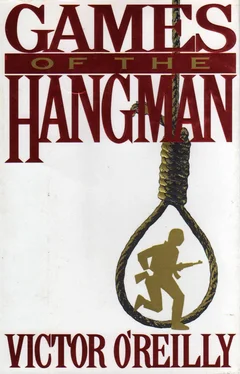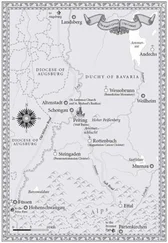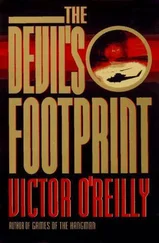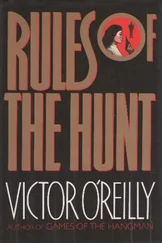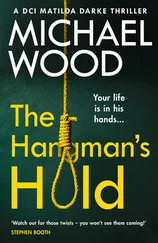Victor O'Reilly - Games of The Hangman
Здесь есть возможность читать онлайн «Victor O'Reilly - Games of The Hangman» весь текст электронной книги совершенно бесплатно (целиком полную версию без сокращений). В некоторых случаях можно слушать аудио, скачать через торрент в формате fb2 и присутствует краткое содержание. Жанр: Триллер, на английском языке. Описание произведения, (предисловие) а так же отзывы посетителей доступны на портале библиотеки ЛибКат.
- Название:Games of The Hangman
- Автор:
- Жанр:
- Год:неизвестен
- ISBN:нет данных
- Рейтинг книги:4 / 5. Голосов: 1
-
Избранное:Добавить в избранное
- Отзывы:
-
Ваша оценка:
- 80
- 1
- 2
- 3
- 4
- 5
Games of The Hangman: краткое содержание, описание и аннотация
Предлагаем к чтению аннотацию, описание, краткое содержание или предисловие (зависит от того, что написал сам автор книги «Games of The Hangman»). Если вы не нашли необходимую информацию о книге — напишите в комментариях, мы постараемся отыскать её.
Games of The Hangman — читать онлайн бесплатно полную книгу (весь текст) целиком
Ниже представлен текст книги, разбитый по страницам. Система сохранения места последней прочитанной страницы, позволяет с удобством читать онлайн бесплатно книгу «Games of The Hangman», без необходимости каждый раз заново искать на чём Вы остановились. Поставьте закладку, и сможете в любой момент перейти на страницу, на которой закончили чтение.
Интервал:
Закладка:
She led him through the kitchen into the next room. As he went through the door, he noticed that the wood stove connected into a two-level stone bench built into the corner of the room. Above the stone bench was a man-size circular hole in the low ceiling. Vreni saw his interest.
"It's a sort of central heating system," she said. "The stove in the kitchen can warm this room here through the stone benches. Also, if we want, we can open the circular trapdoor above the benches and the bedroom above will be warmed. It's called a choust. When it's cold, I go to bed from here through the trapdoor. It saves using the stairs outside.
Fitzduane was intrigued, Ireland traditionally being a land of romantic but inefficient open fireplaces. Vreni left him for a few minutes to finish her baking and to wash her hands. He felt the top stone bench. It was pleasantly warm. He noticed a system of baffles that could be used to adjust the flow of heat.
The room was of a comfortable size. It was furnished adequately, if sparsely, for what was obviously the main room of the house. There was a wooden table and four simple upright chairs. There was a low bed in one corner made up with cushions to serve as a sofa. Several bean bags and other huge cushions were scattered around. There was one pine bookcase. There was none of the normal electronic devices of modern living – no television, no stereo. The one incongruous note was struck by the presence of a telephone on the floor just beside the sofa.
He walked over to look at the books. Most of the titles were in German and meant little to him, but to judge by the photographs and symbols on some of them, they revealed more than a passing interest in left-wing politics. Several books were either by or about a Rudolf Steiner. The name struck a chord in Fitzduane, and then he remembered a German mercenary he had run into a few times called Rolf Steiner. Somehow he didn't think the books referred to the same man.
"Anthroposophy," Vreni said. She held a steaming coffee mug in each hand. She gave him one and then curled up on a bean bag. She wore a loose cotton blouse of Indian design and faded jeans. Her feet were bare. They were perfectly proportioned and without blemish.
"You know the teachings of Steiner," she asked, "Rudolf Steiner?"
Fitzduane shook his head.
"He was an Austrian," she said, "but he worked mainly in Switzerland. Anthroposophy is a philosophy of life he developed. It means knowledge produced by the higher self in man – as opposed to theosophy, knowledge originating from God. Anthroposophy covers all kinds of things."
"Like what?" said Fitzduane.
"Science, education, architecture, a biodynamic approach to farming, and so on, she said. "It even includes eurhythmics. He had a great-aunt of mine dancing barefoot in the morning dew when she was young."
Fitzduane smiled. "And you follow his teachings?"
"In some ways," she said. "Particularly his ideas about farming. Our farming methods here are completely natural. We use no chemicals or artificial fertilizers, no unhealthy additives. It's more work, but it's better, don't you think?"
Fitzduane sipped the hot liquid she had given him. It was a disturbing yellow-brown color and tasted bitter. "I guess it depends what you're used to," he said.
"You like it?" she said, gesturing toward his mug. "It's a special herb tea, my own recipe."
Fitzduane smiled. "I was going to blame Steiner," he said. "Anything that tastes this awful must do you good."
Vreni laughed. "My herb tea is good for everything. It cures the common cold, cleanse the insides, and promotes sexual vigor."
"They used to call that kind of thing snake oil."
"You don't know what you're missing," said Vreni. "Would you like some real coffee instead?"
While she was making the coffee, he continued his browse through the books, steering clear of Steiner. On the bottom shelf, title facing inward, and almost hidden by a row of encyclopedias, was a familiar volume: " The Paradox Business, by Hugo Fitzduane. He flipped through its pages. A pressed flower and a small piece of printed paper slipped from it to the floor. The flower crumbled as he tried to pick it up. The paper was a ski pass. The book fell open at a full-page bleed photograph of Colonel Shane Kilmara.
He called out to her in the kitchen. "I see you've got my book," he said.
"We do?" she said, and there was amusement in her voice. "I'm afraid I didn't know. Most of those books are Peter's."
He replaced the book exactly as he had found it. He could still taste the bitterness of the herb tea on his tongue.
There were two windows in the room. Through one LakeThun could be seen below, bright blue in the sunlight. The second window was set into the end of the room and was at right angles to the first. It looked along the track to a small barn about fifty meters away. The track seemed to end there.
There was something strange about Vreni, something he could not as yet identify. On the face of it, she was calm and self-assured – in fact, so self-assured that it was easy to forget she was only twenty. Her manner suggested experience, a certain knowingness that he had most often encountered in the young in combat zones, where maturity came fast if you were to survive. It was a lack of illusion, a loss of innocence rather than the judgment that came with full maturity. It showed most of all in her eyes.
Yet in contrast with her poise and assurance were other emotions. He could sense an undercurrent of fear, sadness, and loneliness – and a great need for someone to confide in, for someone to help her. There seemed to be things she wanted to say but was afraid to.
Together with his coffee, she brought him a small glass and filled it with an almost colorless liquid. The bottle had fruit floating in it, some berries he could not identify. He tasted it with some trepidation, but it was delicious, a homemade schnapps distilled form fruit grown on the farm.
"We have a communal still in the village," she said. "You can make five liters per person per year without paying any tax, and one liter for each cow. It is used as a medicine for the cows, or at least that was the custom. Now I think the cows don't often see their share."
"And what does Mr. Steiner think of that?" he asked. She threw back and head and laughed again, and for a few moments all the undercurrents were gone. All he could see was a young, beautiful girl with no cares and her life ahead of her.
Outside, the light faded, and it began to freeze again. He helped her bring in more wood from the shed and, away from the warmth of the farmhouse, shivered in the cold of the evening. She showed him around the house. They climbed through the circular trapdoor into the master bedroom. It was sparsely furnished apart from a low handmade double bed, covered with a sheepskin rug, and an old carved wardrobe. A SIG service rifle rested on two wooden pegs on the wall. Vreni saw him glance toward it.
"That is Peter's," she said.
Fitzduane nodded.
"Peter owns this farm," she said, "but he is often away. I don't know when he will be back; it is dull for him here."
"You don't have a photograph of him by any chance, do you?"
Vreni shook her head. "No. He has never liked being photographed. Some people are that way." She smiled. "They think their souls are being stolen."
Next door to the bedroom was a workshop and hobby room. Three were piles of ski equipment. Several planks were removed from the inside of one of the walls."
"Woodworm," she said. "They have to be replaced."
"Why not just spray them?"
"There you go with your chemicals again," she said. "It is wrong. We are just killing nature."
"I understand your father is a director of a major chemical company," said Fitzduane, "among his many interests."
Читать дальшеИнтервал:
Закладка:
Похожие книги на «Games of The Hangman»
Представляем Вашему вниманию похожие книги на «Games of The Hangman» списком для выбора. Мы отобрали схожую по названию и смыслу литературу в надежде предоставить читателям больше вариантов отыскать новые, интересные, ещё непрочитанные произведения.
Обсуждение, отзывы о книге «Games of The Hangman» и просто собственные мнения читателей. Оставьте ваши комментарии, напишите, что Вы думаете о произведении, его смысле или главных героях. Укажите что конкретно понравилось, а что нет, и почему Вы так считаете.
